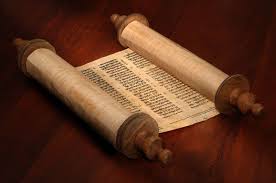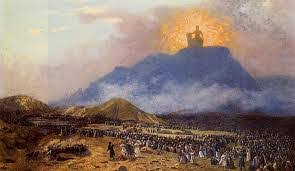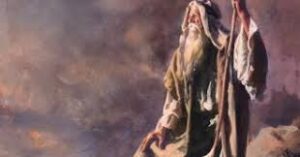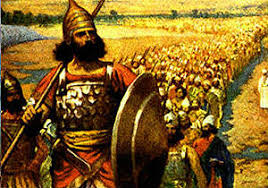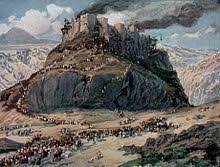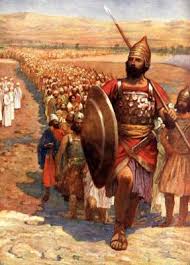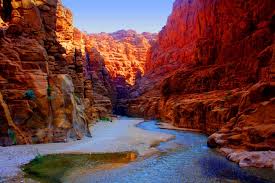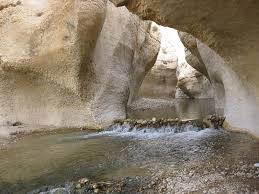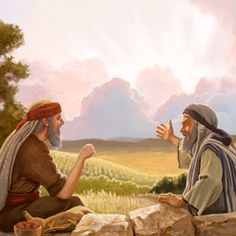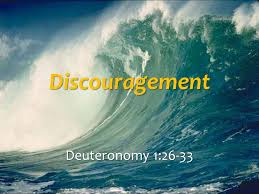Bb – Hear and Obey 4: 1-8
Hear and Obey
4: 1-8
Hear and obey DIG: What two reasons does God give for the necessity of His Torah to the new nation? What do these reasons reveal about God’s expectations for His people? Read Deuteronomy 23-28, 31:18-21, and Jeremiah 7:1-34. Remember that the First Temple was destroyed because of the practice of idolatry and breaking our side of the covenant. Does our covenant with YHVH end when we break it? What is the secret to Jewish success?
REFLECT: What motivates you to godly obedience? First John 5:3 says that God’s “commandments are not burdensome.” How do you experience God’s commandments? What is wisdom? How is wisdom different from human intelligence? What is the source of wisdom? What are some benefits of knowing and obeying God’s wisdom? Would an unbeliever’s commentary on your life resemble what the nations say about Isra’el? Why or why not? How does this make you feel?

Moses commands Isra’el to hear and obey God’s statutes and ordinances so that they will enjoy ADONAI’s blessings, and the surrounding pagan nations would recognize the wisdom and greatness of Isra’el’s Torah, and of Isra’el’s God.
The Israelites were standing at the door of the Promised Land. A Land said to be flowing with milk and honey. By this time, they understood that this Land was not going to be given to them on a silver platter. They had to fight their way in and they had to fight hard to keep it. However, ADONAI never promised them, and He doesn’t promise us that life will be without struggles. But for the believers of every age, God is always with us.
Having concluded his words of rebuke and pointing out that their fathers, as well as himself, had forfeited their right of entering the Promised Land on account of their sins, Moses now turned to the people with the assurance that they were destined to take possession of the Land, on the condition that they remained faithful to God and His Torah.
Chapter 4 is in essence a miniature sermon on the covenant and the Torah, in which the “sermon” prepares the way for the presentation of the Ten Words (to see link click Bk – The Ten Words), and the other statutes (Hebrew: hachukkim, meaning to write into law permanently) and ordinances (Hebrew: hammishpatim, meaning a judgment of the court) that will begin in Chapter 5.107 This chapter can also be considered a version of the armor of God (Ephesians 6:10-17) in the TaNaKh. Moshe begins with the belt of truth, which represents the Word of God
And now (Hebrew: veatah), refers back to the previous narration (see Bc – Do Not Forget). It is preparatory to the appeal to obey here. It was as if Moshe was saying, “And now, in the light of ADONAI’s acts of deliverance, you should obey His commandments” (Exodus 19:5; Deuteronomy 10:12; Joshua 24:14).108
O Isra’el, hear (Hebrew: shema, occurs almost one hundred times in Deuteronomy) to the statutes and ordinances, representing the Word of God, that I am teaching you to do, so that you may live. Hearing and obeying the Word of God was Isra’el’s very life. When YHVH speaks, He sets before us life and death (30:15-20). Not only was Isra’el’s life dependent on obedience to the Torah, but so was her victory over the enemy. Her obedience would enable her to go in and possess the Land that ADONAI the God of your fathers was giving her (4:1). God gave the Torah to Isra’el through Moses to provide parameters for Isra’el’s conduct, not to function as a museum piece.109 How could the LORD go before His people and give them victory if they weren’t following Him obediently (1:30)?
Dear Heavenly Father, How Awesome You are! You are such a wonderful and loving Father! Forgive us for focusing on Your love and forgiveness and forgetting the very painful price You paid for our redemption and rescue from sin’s punishment. (Second Corinthians 5:21; Hebrews 7:27, 9:11-15). We need to remember that just like for Isra’el, You go before us and give victory we need to be obedient. We worship You and rejoice in loving and following You. In Your holy Son’s name and power of His resurrection. Amen
Believers today must find their victory in life from God’s Word. Unless we know what ADONAI commands, we can’t obey Him. But if we know His commandments, believe them, and obey them, then His power goes to work in our lives. And His commandments are not burdensome (First John 5:3). Obeying the LORD becomes a joyful privilege when you realize that His commandments are expressions of His love, assurances of His strength, invitations to His blessing, opportunities to grow and bring Him glory, and occasions to enjoy His love and fellowship as we seek to please Him. God’s Word is an open door into the treasury of His grace.110
Although the actual pronouncement of the Torah does not begin until the following chapters, the nature and purpose of the Torah are explained here, so that the obedience that is called for will not be blind obedience, but an obedience based on understanding. The emphasis is on teaching the Torah because the Torah is the basis of the covenant.111
Here Moshe links Isra’el’s welfare and enjoyment of the Promised Land to her obedience to the Word of God. The duty of obedience and the gift of the Land were interdependent. Later in this same chapter, he elaborates on the same idea: You must keep His statutes and His ordinances, which I am commanding you today, so that it may go well with you and with your children after you, and so that you may prolong your days in the Land that ADONAI your God is giving you for all time (4:40). The idea that righteousness lengthens life and sin shortens it, is common in the TaNaKh (Proverbs 3:1-2 and 16, 10:27).
How would the Israelites guard the Word of God? The Ruach ha-Kodesh had Moshe write: You must not add to the word that I am commanding you or take away from it – in order to keep the statutes and ordinances of ADONAI your God that I am commanding you for it diminishes its divine purpose (4:2). Tragically, the Israelites eventually elevated the Oral Law (see the commentary on The Life of Christ Ei – The Oral Law) to a place equal, or even superior to, the Torah, even though Moshe had warned against that here. Almost every heresy and sect has originated in a supposed revelation or a new experience on the part of its founder, something outside the teachings of the Bible. It is the elevation of experience over the authority of Scripture that grieves the Ruach ha-Kodesh most of all.
The changes and modification made to the Word of God have resulted in tragedy in the history of Isra’el and also in the history of the Church. A vivid illustration of the fact that disobedience to the commandments of YHVH brings destruction and death is now given. It all began in the Garden of Eden, where Adam and Eve fell because they added and took away from the Word of God. The Serpent began by putting a doubt in the mind of Eve when he said to the woman, “Did God really say: You must not eat from any tree in the garden? You will not surely die (3:1b and 4), when ADONAI had clearly declared: You must not eat fruit from the tree that is in the middle of the garden, and you must not touch it, or you will die (3:3). This paved the way for the fall of all mankind, and the same mistake is at the root of Isra’el’s suffering over the ages.
This was the same complaint of the prophets, who, like Moshe, linked Isra’el’s ultimate punishment of being banished from the Land as a result of her disregard and modification of the Word of God. Isaiah said: Therefore, My people are in captivity for lack of knowledge (Isaiah 5:13), and Hosea said it this way: My people are destroyed for lack of knowledge (Hosea 4:6).
When Yeshua came to the earth, He also assessed the reason for Isra’el’s afflicted state when He said: You are making void the Word of God with your tradition that you’ve handed down (Mark 7:13). How many times did Messiah warn Jewish religious leaders not to add or take away from the Scriptures? Have you never read the Scriptures (Matthew 21:42)? Haven’t you read what was spoken to you by God (Matthew 22:31)? Isn’t this the reason you’ve gone astray because you don’t understand the Scriptures (Mark 12:24)? And today these words still apply. Isra’el needs to understand that their individual and national salvation is found in God and His Word. This tragedy extends to the Church as well. We see similar warnings in every epistle about keeping the Word of God and avoiding false teachers. This is why the B’rit Chadashah ends with John’s stern warning: I testify to everyone who hears the words of the prophecy of this book. If anyone adds to them, God shall add to him the plagues that are written in the book; and if anyone takes away from the words of the book of this prophecy, God shall take away his share in the Tree of Life and the Holy City, which are written in this book (Revelation 22:18-19).
The cults add to the words of the Bible and the liberals take them away. The form of the warning comes from Deuteronomy 4:2, where God admonishes Isra’el, “Do not add to what I command you and do not subtract from it, but keep the commands of ADONAI your God that I give you.” The Israelites were to worship their God in total and complete obedience. His Word is sufficient and complete. In Deuteronomy 12:32 Moshe added: See (Hebrew: r’eh) that you do all I command you; do not add to it or take away from it. Proverbs 30:5-6 warns: Every word of God is flawless; He is a shield to those who take refuge in Him. Do not add to His words, or He will rebuke you and prove you a liar. Therefore, the prohibition against altering the words of Revelation by implication extends to the entire Bible (see the commentary on Revelation Gd – If Anyone Adds to the Words of this Book, God Will Add to Them the Plagues Described).112
Using an emotional illustration from their own history, Moshe refers to the incident at Peor when their very lives depended on total obedience to God’s Word. Your eyes have seen what ADONAI did at Peor, for ADONAI your God has destroyed from among you everyone who followed the false god Ba’al of Peor (4:3). If Isra’el’s rebellion at Kadesh Barnea represented the lowest point in her relationship with YHVH, their rebellion at Ba’al Peor was the freshest in their memory (Numbers 25:1-9; Psalm 106:28; Hosea 9:10). Moses recalled the fact that all who followed the false god Ba’al at Peor had perished, and they who remained faithful to God were still alive. This testified to Moshe’s teaching that obedience to God’s commandments meant life.
Balaam tried to put a curse on the Jews, but it didn’t work (Numbers 23 and 24). So, he tried a different tactic. He found a weakness in the men of Isra’el. At his direction, the women of Mo’ab and Midian were sent out to entice the Jewish men, and they did not come alone. They brought their gods with them. Eventually Balaam prevailed and his plot worked. The men of Isra’el fell and the whole nation was cursed. This was an example of what happens when the Word of God is neglected. Idolatry infiltrated Isra’el and 24,000 died because of the plague that ADONAI had sent against them.
The problem of idolatry has affected the Church as well. Yeshua addressed this when He said to the church in Pergamum: Nevertheless, I have a few things against you. You have some people there who hold to the teaching of Balaam, who taught Balak to entice the Israelites to sin by eating food sacrificed to idols and by committing sexual immorality (2:14). Like many today, they had failed to heed to biblical warnings against worldliness. Consequently, it was flirting and in danger of falling in love with the world. This was a fitting warning because it was addressed to the church in Pergamum which represented the Church during the Age of Constantine (see the commentary on Revelation Bb – The Church at Pergamum). Pergamum literally means thoroughly married, and as the body of Messiah became thoroughly married to the Roman Empire. The wheat, in effect, married the weeds (see the commentary on The Life of Christ Ev – The Parable of the Wheat and the Weeds). As the idol worship gained acceptance in the Church, it declined in spiritual blessing and power. In reality, like the Jews at Ba’al Peor, the church at Pergamum began to commit spiritual adultery.113
At Peor, the Jewish men who refused the invitation to idolatry and remained true to the LORD were still alive. But you who held tight to ADONAI your God are alive today – all of you (4:4). It is the same for us today. The Word of God is our lifeline, and obeying God’s Word keeps us in fellowship with Him (Second Corinthians 6:14-7:1). God’s people must be careful not to become too friendly with the world (James 4:4), because this leads to loving the world (First John 2:15-17), and being conformed to the world (Romans 12:2). This kind of lifestyle invites the discipline of YHVH (see the commentary on Hebrews Ci – If We Deliberately Keep On Sinning, No Sacrifice For Sins is Left).
More and more people are asking in the world, “What is the secret of the Jews? Why and how do they succeed?” We try to analyze all the reasons for our knowledge, such as our education, languages, mathematics, money management, music, and a thousand different studies that try to put our finger on the best-kept secret as Jews. The Torah cracks open this secret and reveals it to everyone: See, just as ADONAI my God commanded me, I have taught (Hebrew: limmadti, a perfect verb indicating past actions that are seen as now completed) you statutes and ordinances to do in the Land that you are about to enter to possess. You must keep and do them, for it is your wisdom and understanding in the eyes of the peoples, who will hear all these statutes and say: Surely this great nation is a wise and understanding people (4:5-6).
The secret of wisdom is in the Word of God. How blessed are those who reject the advice of the wicked, don’t stand in the way of sinners or sit in the seat of mockers! Their delight is on ADONAI’s Torah; on His Torah they meditate night and day. They are like trees planted by streams of water, they bear fruit in season, their leaves never wither, everything they do succeeds (Psalm 1:1-3). The secred of wisdom is God’s Word. In knowing God’s word, the people of Isra’el would not only succeed in their mission but they would also be witnesses to the other pagan nations around them, who placed great value on wisdom. And we need to know and obey His wisdom if our lives are to please and glorify Him. For the world’s wisdom is foolishness in the sight of God (First Corinthians 3:19), and those who follow it will be disappointed. In the TaNaKh, the word wisdom has to do with character rather than human intelligence and describes the ethical use of knowledge.114
Finally, the distinctiveness in Isra’el’s relationship with ADONAI is made clear. The covenant would distinguish Isra’el from her neighbors. Unlike their distant relationship with remote and inaccessible gods, Isra’el’s loving relationship with YHVH would amaze the Gentile nations. Isra’el would be respected by the peoples of the world if they would obey and practice the Torah, with a full understanding. For what great nation is there that has gods so near to them, as ADONAI our God is whenever we call on Him? What great nation is there that has statutes and ordinances that are righteous – like all of this Torah that I am setting before you today (4:7-8)? Ha’Shem’s Torah would exceed everything that the goyim had ever heard. And as those nations were amazed at Isra’el’s greatness, they would also be amazed at Isra’el’s God.115



